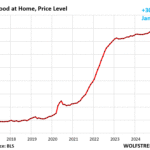This week I met a new client who had fallen victim to two commonly held personal finance beliefs that simply aren’t true. So in this post I want to unmask these charlatans of the financial world and hopefully protect you from making the same mistake that plenty of others have succumbed to. Let’s dive in.
False belief #1 – Property always goes up in value
Property investment is a religion in Australia, fuelled by a growing population and favourable tax treatment. But as with any investment, property investment entails risk.
The person I spoke to this week purchased an apartment off the plan 10 years ago. They sold it recently for $70,000 less than they paid for it. Over the 10 years of ownership, expenses each year always exceeded the income generated. This cash flow loss is what is known as negative gearing, and is generally sold as a positive, on the basis that the loss can be claimed on your tax. However that positive take completely unravels if there is no capital gain at the end to compensate you for that ongoing loss. Sure, you’ve generated some tax savings, but in no way does this fully compensate you for the loss you’ve incurred on an ongoing basis.
So this person lost money every year on this property, and then when they sold, they suffered a capital loss as well.
The fact that this occurred on an investment made via an off the plan purchase, is the most obvious warning sign. If you’ve been reading this blog for a while, you’ve probably seen me make this observation before. I’m sure there are some people who make money purchasing properties off the plan, but in my more than 20 years of providing financial planning advice, I’ve only met one. It’s very hard to assess the value of a property before it’s been built. And when it comes to apartments, they often look great at the beginning, but tired and shabby a decade or so later, especially those built to a budget.
Properties declining in value however is not limited to off the plan apartment purchases. There are plenty of people who bought regional properties during COVID, when it seemed like we’d never return to the office. Today most of those purchases are underwater, with sellers having to take what they can get amongst a scarcity of buyers.
The takeaway then is don’t believe the fallacy that properties always increase in value. A property investment entails risk, just like any other investment. Do your homework, ensure you have a long-term holding period, and don’t put all your eggs in one basket.
False belief #2 – Self Managed Super produces a better return than off the shelf super funds
This poor investment outcome was in part facilitated by the couple being sold on the proposition that their existing industry super funds were lazy and hopeless, and they could do much better for themselves if they took control and shifted to a Self Managed Super fund.
Self Managed Super Funds certainly have a place in Australia’s retirement landscape. But they are not some magic financial vehicle guaranteed to put you on the path to a retirement of abundance.
Self Managed Super Funds have annual accounting and audit costs that mean they typically don’t make sense for those with balances under $500,000. But even when you get to balances at this level and above, the move to a Self Managed Super fund is far from a lay down misère. As highlighted in the name, a Self Managed Super fund is for those who want to self manage their retirement savings. Your retirement savings are likely to be either the largest or second largest financial asset on your balance sheet. Taking on the responsibility for self managing such an important asset is a very big undertaking, and not something to be done in an amateurish way. Of course you can obtain financial planning help in doing this management, but that comes at a cost, which then needs to be compared against having stuck with your off the shelf super fund, or alternatives like wrap solutions which provide high levels of control and transparency, but without the legal obligations associated with Self Managed Super funds.
For most people, a Self Managed Super Fund is not the best way to manage their retirement savings. Your large industry and retail super funds do a good job of managing risk and keeping costs down. Exit them at your peril.








